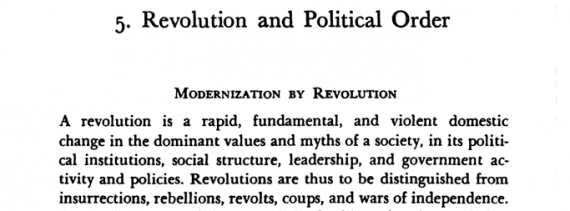Some Basic Political Science Regarding Egypt
Some thoughts on the ongoing situation in Egypt.
I have been travelling for work and family and have been a bit out of the blogging loop, so I m a little late in commenting on the unfolding events in Egypt, but here are some thoughts that have been rattling around in my brain:
1. Yes, it’s a Coup. Regardless of what people want to call it, the actions by the Egyptian military to remove Morsi from office was a coup. A coup is an extralegal action to remove the head of a government (it can also refer to extralegal dissolutions of legislature, see, e.g., Fujimori, Alberto in Peru). By “extralegal” I simply mean outside the scope of established processes. In the US, for example, the only legal way to remove a sitting president is the impeachment and removal process. Any other means would be outside the established law, hence “extralegal.” The term “illegal” is often not used not because an extralegal action is legal, but because there may not actually be a law governing the action taken (again, hence “extra”). There are almost certainly no laws that forbid the military from doing what they did, but then again no law authorizing either.
This is, in fact, the second coup in the ongoing political turmoil in Egypt. Back in 2011 when Mubarak was removed, that was also a coup (as I argued at the time). The political crisis in Egypt has resulted in the game being played without adequate rules and that underlying problem has not ben fixed yet.
2. No, it’s not a Revolution.
Part of the confusion is just misuse. For example, there is a tendency in the press (and amongst participants) to call any mass protest a “revolution” (see, for example, the Orange Revolution, the Cedar Revolution, and the Green Revolution—none of which were actually revolutions). And, of course, participants prefer to call such events “revolutions” because that is what they want: major change. Calling something a revolution, however, does not make it so.
A revolution is a very rare social phenomenon (as I noted back at the start of these events) that results in change to the political, economic, and social structures of a country. Classic examples of true revolutions include France, Russia, China, Cuba, Iran, and Nicaragua. To quote from Samuel Huntington’s Political Order in Changing Societies (264) we get both a definition of a coup and of a revolution (definitions that are widely accepted in the political science literature, although no doubt quibbled about on the margins):
A revolution is a rapid, fundamental, and violent domestic change in the dominant values and myths of a society, in its political institutions, social structure, leadership. and government activity and policies. Revolutions are thus to be distinguished from insurrections, rebellions, revolts, coups, and wars of independence. A coup d’etat in itself changes only leadership and perhaps policies; a rebellion of insurrection may change policies, leadership, and political institutions, but no social structure and values; a war of independence is a struggle of one community against rule by an alien community and does not necessarily involve changes in the social structure of either community. What is here called simply “revolution” is what others have called great revolutions, grand revolutions, or social revolutions. Notable examples are the French, Chinese, Mexican, Russian, and Cuban revolutions.
Revolutions are rare.
Emphases are mine.
The bottom line is that while there have now been multiple changes in terms of who is in charge (at least nominally, if not in reality) of executive authority in Egypt there has not been a major restructuring of politics, economics, or social structure in Egypt.
3. Yes, Words are Political. The fact that there are disputes over what words to use is a mix of misuse of terms and politics (indeed, it is mostly politics). If one is anti-Morsi, one does not want to call recent events a “coup” because it has a negative connotation. If one is pro-Morsi, one prefers the term with the negative connotation. Likewise, “revolution” tends to have a positive connotation.
In the case of the US, there is the very real political difficulty of calling these events a “coup” because of the laws concerning aid to countries where a coup removes an elected leader (which Doug Mataconis discussed a few days ago). One thing I would note on this specific issue: the fact that Obama administration is trying to finesse the topic is not endemic to the Obama administration. Any US president would be doing the same thing. The reason the US gives all that money to Egypt in the first place is about the strategic significance of Egypt. Just look at a map and note the country’s proximity to Israel, not to mention the Suez Canal and its relevance to the flow of oil. Indeed, while I have noted many trying to make political hay out of the Obama administration’s continuation of support for Egypt, if one knows one’s history, one should note that the massive amounts of foreign aid the US provides to Egypt is long-standing and is very much linked to US policy towards Israel as well as to energy. These are rather major components to US foreign policy regardless of one’s views on ongoing events. This is not to say that the policy is good, bad, or indifferent. It is to say that understanding of the policy requires a multi-decade view, not one vested in one’s views of the current administration. It is also to say that if one knows one’s history one should know that changing those standing policies is not an easy thing to do, nor it is something to be done on a capricious reaction to short-term events.
4. Yes, Institutions Matter. The ongoing situation in Egypt points to the importance of institutions (i.e., rules and structures that govern political activity) in more than one way. In terms of the post-Mubarak period we saw a lot of playing of the game without clear rules (i.e., without established, functioning institutions).
As my co-author on a forthcoming book about political institutions, Matthew Shugart, noted at the time:
It would seem that one would not want to wait until the week of a presidential election-or worse still, between rounds of said election-to define the powers of the president-to-be. But then there is Egypt.
I believe it is unusual for a president to be elected before a constitution-even a provisional one-has been enacted. Normally, there is a constituent assembly, during which time a provisional government remains in place, as in Tunisia currently, or else a constitution is negotiated prior to any elections (as with several Eastern European and African transitions of the 1990s).
The sequencing matters. To put it in simple terms, what they did in Egypt is like what many of did as kids playing in the front yard on a summer afternoon: they starting playing a game without establishing the rules and then the players started to call fouls based on their own personal preferences. And, like children in the yard yelling “not fair!” or “that’s not a rule!” the situation degenerated into a fight. And, like those front yard brawls, the big kids (in this case the military) were the winners in the fight, not because they were necessarily right, but because they were the most powerful.
When there are no established rules, power ends up winning the day. One constant in the entire Egyptian process has been that the military has remained intact and has been a fairly autonomous actor (i.e., there is no authority controlling them).
If one goes back and looks at the process one will see a problematic constitution-writing process as well as an ongoing set of institutional clashes and other examples of lack of agreement over the rules (or, more precisely, a lack of clear and accepted rules).
5. No, it’s not Over Yet. Anyone who pays attention to political transitions should not be surprised that the ouster of Mubarak did not settle the political scene in Egypt. These types of processes are often lengthy and they have ebbs and flows. To get back to the previous point: until there are regularized processes established and accepted by the participants, this process will not be complete.
Image: Google Books



![Military Coup Underway In Egypt [Update: Morsi Deposed]](https://otb.cachefly.net/wp-content/uploads/2011/02/egypt-flag3-512x256.gif)



A very helpful primer.
I suppose at some point usage overtakes convention on language. To the degree that we call our war for independence a revolution often enough, the popular understanding of what constitutes “revolution” changes.
I don’t see how what happened in Egypt is other than a coup. I do, however, understand why we wouldn’t want to call it one. Aside from the issue of forcing us to cut off aid, which you’ve noted, is the simple fact that Morsi is out and we have to have diplomatic leverage with the de facto government of the most important country in an important region.
Agree completely.
Also, as I said in my post yesterday here, there are only two robust institutions in Egypt today: the military and the Muslim Brotherhood. Societies and governments are built on institutions or, as you put it, institutions matter. The choices are between the manifest incompetence of the Muslim Brotherhood and military rule. Over time and given suitable conditions, other institutions could gain strength.
But that will take time and rather obviously won’t happen by itself. We’ve spent 40 years doing the wrong thing with respect to Egypt. If it’s not time to start doing the right thing now, when will it be?
@James Joyner:
Correct, there is a difference between popular and professional understandings of words.
To that point the moment someone makes the decision to engaging in real analysis (or commentary on an analysis) they should be expected to follow the overall tone of the discourse (which in a case like this means making the jump from popular to professional).
Great article Steven!
By the way, the Brazilian Military regime called the Military coup that granted then with power as a revolution.
@James Joyner:
Indeed, this example helps illustrate my point: the participants in any political upheaval tend to like to call that upheaval a “revolution” and hence the American mythology likes to call what was a war for independence a “revolution” when, in fact, the basic social and economic structure of the colonies did not change, Indeed, many of the pre-independence elites were the post-independence elites.
I would liken this to things like the popular habit of calling various types of tummy troubles the “stomach flu” when, in fact, that isn’t what it is (i.e., it isn’t caused by the influenza virus).
@Andre Kenji:
Indeed. Revolutions sound so much better!
@Dave Schuler:
It would be nice if the US would use its leverage to help an institution building process (a legitimate constituent assembly would be a nice start).
@Steven L. Taylor:
Not only that: that´s a way of giving Legitimacy to a Military coup.
@Andre Kenji: Exactly.
@Steven L. Taylor:
The US could screw up a wet dream. I suspect the best thing we can do is stay out of the way.
@OzarkHillbilly: Point taken. Of course, the bottom line remains that the US is involved no matter what and can’t simply stay out of the way. Indeed, trying to stay on the sidelines is, in and of itself, a policy choice that affects the process.
@Steven L. Taylor:
Sigh… Too true, all too true. Thanx for removing my last particle of hope. 😉
Did you catch this from Josh Marshall over at TPM?
Money quote:
“I got on this kick when I noticed what I have to say is one of the most fascinating and weirdest developments in Egypt’s now week long coup/revolution/uprisingthing. There are a lot of people in Egypt who aren’t just mad at Morsi and upset with the US for not more forcefully supporting his ouster. Many actually think the US is actively supporting a Muslim Brotherhood takeover of the country. And just to be certain we’re crystal clear: I don’t mean supporting Morsi and the Brotherhood as the legitimate government because they won a fairly free national election. I mean a conspiracy to help the Brotherhood take over the country, even to the extent of rigging the election that brought him to power.“
The inner pedant that I have trouble suppressing at times wishes to build somewhat on the discussion above regarding the meaning of ‘revolution’. Seems to me that the overturning of two successive governments by (mostly) urban crowds of (mostly) young people indicates that the “revolution” (in Dr Taylor’s sense of ‘a rapid, fundamental, and violent change in the dominant values and myths of a society”) has already occurred and destroyed the Nassar, Sadat, Mubarak line of military rulers. The only somewhat organized successors turned out to be the (mostly) older and rural Moslem Brotherhood. Their rule was unsuccessful (in the sense of not solving national problems such as electrical distribution or food prices as well as in the sense of not building a larger coalition). So the same urban, young crowds/mobs mobilized to do the only thing they know how to do which is deny the legitamacy of the M.B. gov’t.
As so often, probably a distinction without a difference. But thinking of revolutions such as the French or Bolshvik revolutions, the presence of a previously existing urban crowd/mob is pretty much a necessary condition.
@JohnMcC:
Except that it was the military that ousted Mubarak and the military that ousted Morsi. There is really no evidence that the military is anything but still a very significant political (and economic) actor.
Indeed, while the politics of Egypt are in upheaval at the moment, the basics of economic and social order have hardly been restructured. Further, since the military remains the most pivotal political actor, not that much has changed there, either.
Part of the point is that mobs and urban protests do not a revolution make (again: see the Orange, Green, and Cedar “Revolutions”).
@OzarkHillbilly:
This is why any US pressure on Egypt is going to have to be applied with great care. Its a dangerous fantasy that we can order around the primary players in Egypt in some brusque and obvious manner-a fantasy that McCain and quite a few Americans are prey to.
@Steven L. Taylor: Yes, sir, I understand. As I said — a distinction without much difference. But without an Arab equivalent to the Russian proletariate or Paris’ sans culottes, I doubt the military chiefs would have moved against Mr Mubarak whose base of support had previously been the military. And if the M.B. had the support of the urban youth crowds in Tahrir Square, I doubt the military would have moved against Mr Morsi no matter how much they hate the M.B. Enough, though. I surrender the field.